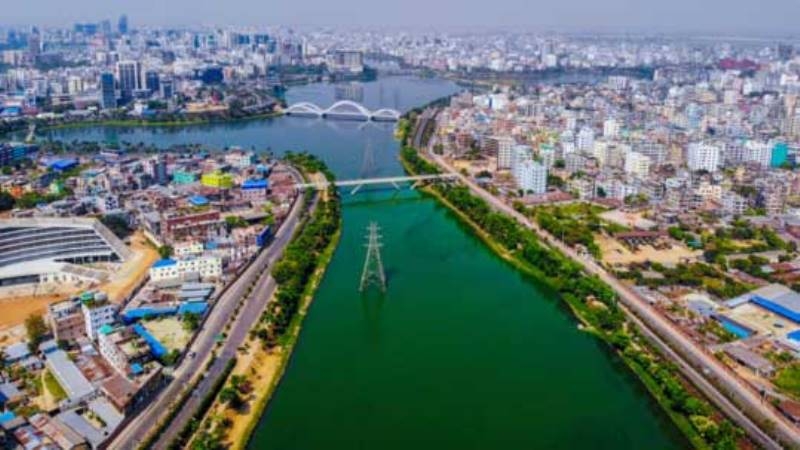- US Supreme Court Voids Donald Trump Global Tariffs |
- India looks forward to engaging with new govt in Bangladesh |
- No more running after doctors, services to reach doorsteps |
- ‘Revolutionary’ shift in economy, stock market soon: Amir Khashru |
- Stocks end week sharply lower as DSE, CSE indices tumble |
BD Can Boost Growth & Climate Resilience Investing in Women

Credit- Ibnul Asaf Jawed Susam-iStock via Getty Images. IMF
By Jayendu De and Genet Zinabou
WASHINGTON DC, Jun 14 2024 (IPS) - Bangladesh has made major gains for its population, the world’s eighth largest with more than 170 million people. Per capita incomes, one of the best measures of broad economic well-being, have risen seven-fold in the past three decades while poverty has been reduced to a fraction of former levels.
Such progress has been driven in part by greater labor force participation by women, most notably in the garment industry, and has been accompanied by other meaningful improvements in women’s empowerment.
Our recent analysis, however, shows there are still large gaps between women and men. Notably, women’s labor force participation is only half the rate of men.
Prior IMF research shows that closing this gap could increase the country’s economic output by nearly 40 percent. Women also remain less likely than men to obtain tertiary education, and they face greater barriers in accessing financial services. Remedying both factors could raise the entire economy’s productivity.
At the same time, efforts to close gender gaps face headwinds from Bangladesh’s extreme vulnerability to climate change and natural disasters. Like other economic shocks, climate shocks generally affect the already poor and vulnerable the most. This means that Bangladeshi women, who on average have fewer resources than men, are likely to be disproportionately impacted.
Our analysis further highlights several factors that render women in Bangladesh uniquely exposed to the effects of climate change and natural disasters:
• Women’s employment in Bangladesh is highly concentrated in agriculture and informal work. Climate change very directly affects agricultural production, whereas informal workers are often particularly vulnerable to climate shocks as they lack access to social insurance programs.
• International and internal migration are important climate adaptation strategies, availed mostly by men. Bangladeshi men are 16 times more likely to be employed overseas than women, who tend to be primary care givers for children and the elderly, leaving them less mobile and more likely to remain living in areas highly exposed to climate change.
• Women in Bangladesh carry primary responsibility for collecting drinking water and cooking fuel. As warming temperatures, rising sea levels, deforestation and more frequent cyclones and droughts render these tasks more time-consuming, women’s time poverty is expected to be exacerbated.
Bangladesh already recognized the need to integrate gender perspectives in its 2009 Climate Change Strategy. Following this, the government adopted the first Climate Change and Gender Action Plan 2013, which it updated in March 2024.
Renewed efforts will be needed to ensure successful implementation of the plan and achieve simultaneous progress on climate action and gender equality.
To this end, policymakers should capitalize as much as possible on the synergies between women’s empowerment, economic growth, and increased resilience to climate change.
Policies that support women’s labor force participation deserve particular attention, including those that expand their access to skills development and higher education, ease unpaid care burdens by expanding affordable childcare, reduce informality, and address gender norms that discourage women from seeking formal jobs and higher pay.
Boosting health and education spending would help empower women while raising labor productivity and making the whole population more resilient to climate change.
Persistent gaps between women and men in access to finance should be tackled by instilling confidence in formal finance, strengthening women’s property rights and carrying out financial literacy campaigns targeted at women.
Bangladesh was an early adopter of gender responsive budgeting and has more recently introduced climate budget tagging, a tool for tracking climate-related spending in the national budget.
However, insufficient integration of gender and climate considerations during the initial strategic phase of budget formulation means that the system in Bangladesh currently functions primarily as an ex-post accounting exercise.
Improvements in this area combined with more systematic impact assessment of government programs would enable more efficient channeling of public resources toward achieving the country’s gender equity and climate goals.
Lastly, women should not be thought of as mere beneficiaries of climate action. Rather, just as women played an integral role in the development of the garment industry and Bangladesh’s growth success in recent decades, they should be empowered to play an active role in the country’s green transition.
The IMF’s engagement with Bangladesh, including the country becoming the first in Asia to access our new Resilience and Sustainability Trust, aims to support policy efforts in many of these directions.
Jayendu De is the IMF Resident Representative in Bangladesh. Genet Zinabou is an economist in the Fiscal Affairs Department, IMF.
Source: International Monetary Fund (IMF)
IPS UN Bureau

